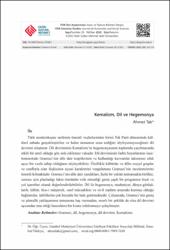| dc.contributor.author | Tak, Ahmet | |
| dc.date.accessioned | 2022-12-29T10:35:05Z | |
| dc.date.available | 2022-12-29T10:35:05Z | |
| dc.date.issued | 2022 | en_US |
| dc.identifier.citation | TAK, Ahmet. "Kemalizm, Dil ve Hegemonya." FSM İlmî Araştırmalar İnsan ve Toplum Bilimleri Dergisi, 20 (2022): 503-519. | en_US |
| dc.identifier.uri | https://dergipark.org.tr/tr/pub/fsmia/issue/74336/1225651 | |
| dc.identifier.uri | https://hdl.handle.net/11352/4231 | |
| dc.description.abstract | Türk modernleşme tarihinin önemli veçhelerinden birini Tek Parti döneminde kültürel sahada gerçekleştirilen ve halen tamamen sona erdiğini söyleyemeyeceğimiz dil
devrimi oluşturur. Dil devriminin Kemalizm’in hegemonyasının toplumda yayılmasında
etkili bir amil olduğu göz ardı edilemez vakadır. Dil devriminin farklı boyutlarının incelenmesinde Gramsci’nin dile dair tespitlerinin ve kullandığı kavramlar takımının ufuk
açıcı bir vasfa sahip olduğunu söyleyebiliriz. Özellikle kültürün ve dilin sosyal gruplar
ve sınıflarla olan ilişkisinin siyasi karakterini vurgulaması Gramsci’nin incelemelerini
önemli kılmaktadır. Gramsci’nin dile dair yazdıkları, fazla bir yekûn tutmamakla birlikte,
sonrası için planladığı lakin ömrünün vefa etmediği geniş çaplı bir programın özeti ve
yol işaretleri olarak değerlendirilebilirler. Dil ile hegemonya, maduniyet, dünya görüşü,
tarih, kültür, hiss-i müşterek, sınıf mücadelesi ve sivil toplum arasında kurmuş olduğu
bağlantılar, tahlillerini çok boyutlu bir hale getirmektedir. Çalışmada, Gramsci’nin geniş
ve şümullü yaklaşımının tamamına baş vurmadan, sınırlı bir şekilde de olsa dil devrimi
açısından ima ettiği hususların bir kısmı irdelenmeye çalışılmıştır. | en_US |
| dc.description.abstract | One of the important aspects of the history of Turkey’s modernization is the Turkish
language reform that took place in the cultural field during the Single Party period, and
which we cannot say has ended yet. It cannot be ignored that the Turkish language reform
was a key factor in spreading the hegemony of Kemalism in society. It can be suggested
that Gramsci’s findings on language and the set of concepts he uses have a seminal role
in the study of the different dimensions of the Turkish language reform. In particular,
Gramsci’s emphasis on the political character of the relationship of culture and language
to social groups and social classes makes his studies important. Gramsci’s writings on the
language, although they do not hold much of a whole, can be considered as a summary
and road signs of a large-scale program that he planned for the future but did not live long
enough to do so. The connections that he establishes between language, hegemony, subalternity, worldview, history, culture, commonsense, class struggle and civil society make
his analyses multidimensional. This study aims to examine some of the points Gramsci’s
work implied with regard to the Turkish language reform without referring to his broad
and comprehensive approach entirely and albeit in a limited way. | en_US |
| dc.language.iso | tur | en_US |
| dc.publisher | FSM Vakıf Üniversitesi | en_US |
| dc.relation.isversionof | 10.16947/fsmia.1225651 | en_US |
| dc.rights | info:eu-repo/semantics/openAccess | en_US |
| dc.subject | Gramsci | en_US |
| dc.subject | Dil | en_US |
| dc.subject | Hegemonya | en_US |
| dc.subject | Dil Devrimi | en_US |
| dc.subject | Kemalizm | en_US |
| dc.subject | Language | en_US |
| dc.subject | Hegemony | en_US |
| dc.subject | Language Reform | en_US |
| dc.subject | Kemalism | en_US |
| dc.title | Kemalizm, Dil ve Hegemonya | en_US |
| dc.title.alternative | Kemalism, Language and Hegemony | en_US |
| dc.type | article | en_US |
| dc.relation.journal | FSM İlmî Araştırmalar İnsan ve Toplum Bilimleri Dergisi | en_US |
| dc.contributor.department | FSM Vakıf Üniversitesi | en_US |
| dc.contributor.authorID | https://orcid.org/0000-0001-7989-7620 | en_US |
| dc.identifier.issue | 20 | en_US |
| dc.identifier.startpage | 503 | en_US |
| dc.identifier.endpage | 519 | en_US |
| dc.relation.publicationcategory | Makale - Ulusal Hakemli Dergi - Başka Kurum Yazarı | en_US |



















